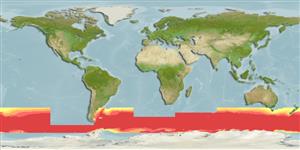Environment: milieu / climate zone / depth range / distribution range
Écologie
marin bathypélagique; océanodrome (Ref. 5182); profondeur 1 - 1008 m (Ref. 114491), usually 100 - 350 m (Ref. 4066). Deep-water; 39°S - 69°S, 180°W - 180°E (Ref. 5182)
Circumglobal between the Subtropical Convergence and Antarctic Polar Front.
Length at first maturity / Taille / Poids / Âge
Maturity: Lm 8.3 range ? - ? cm
Max length : 11.2 cm SL mâle / non sexé; (Ref. 114491); 9.6 cm SL (female); poids max. publié: 12.10 g (Ref. 5182); poids max. publié: 12.10 g; âge max. reporté: 6 années (Ref. 31516)
Épines dorsales (Total): 0; Rayons mous dorsaux (Total): 13-15; Épines anales 0; Rayons mous anaux: 18 - 20
Oceanic and mesopelagic, found in the upper 100 m south of 50°S, but below 550 m in the region of Subtropical Convergence (Ref. 4066). Migrates from 80 to 140 m to the surface at about 18h00 with ascent rate of 0.5 m per minute; the descent rate is 1.8 m per minute. Forms the main component of the Deep Scattering Layer in the Pacific sector. Feeds on copepods, hyperiids and euphausiids, but also takes ostracods and gastropods. Eaten by squid and to an insignificant degree, by fishes (Channichthyidae, Notolepis sp.) and birds (Procellariidae).
Life cycle and mating behavior
Maturité | Reproduction | Frai | Œufs | Fécondité | Larves
Hulley, P.A., 1990. Myctophidae. p. 146-178. In O. Gon and P.C. Heemstra (eds.) Fishes of the Southern Ocean. J.L.B. Smith Institute of Ichthyology, Grahamstown, South Africa. (Ref. 5182)
Statut dans la liste rouge de l'IUCN (Ref. 130435)
Menace pour l'homme
Harmless
Utilisations par l'homme
Plus d'informations
CollaborateursImagesStamps, Coins Misc.SonsCiguateraVitesseType de nageSurface branchialeOtolithesCerveauxVision
Outils
Articles particuliers
Télécharger en XML
Sources Internet
Estimates based on models
Preferred temperature (Ref.
123201): -1.3 - 2.4, mean 0.7 °C (based on 31 cells).
Phylogenetic diversity index (Ref.
82804): PD
50 = 0.5312 [Uniqueness, from 0.5 = low to 2.0 = high].
Bayesian length-weight: a=0.00692 (0.00297 - 0.01609), b=3.13 (2.93 - 3.33), in cm total length, based on LWR estimates for this (Sub)family-body shape (Ref.
93245).
Niveau trophique (Ref.
69278): 3.2 ±0.0 se; based on diet studies.
Generation time: 2.0 ( na - na) years. Estimated as median ln(3)/K based on 1
growth studies.
Résilience (Ref.
120179): Milieu, temps minimum de doublement de population : 1,4 à 4,4 années (K=0.55; tmax=5.5).
Fishing Vulnerability (Ref.
59153): Low vulnerability (24 of 100).
Nutrients (Ref.
124155): Calcium = 101 [28, 274] mg/100g; Iron = 0.564 [0.211, 1.748] mg/100g; Protein = 15.9 [14.2, 17.7] %; Omega3 = 0.312 [0.105, 0.898] g/100g; Selenium = 14.1 [4.4, 45.1] μg/100g; VitaminA = 70.5 [8.4, 565.3] μg/100g; Zinc = 0.808 [0.411, 1.717] mg/100g (wet weight); based on
nutrient studies. 